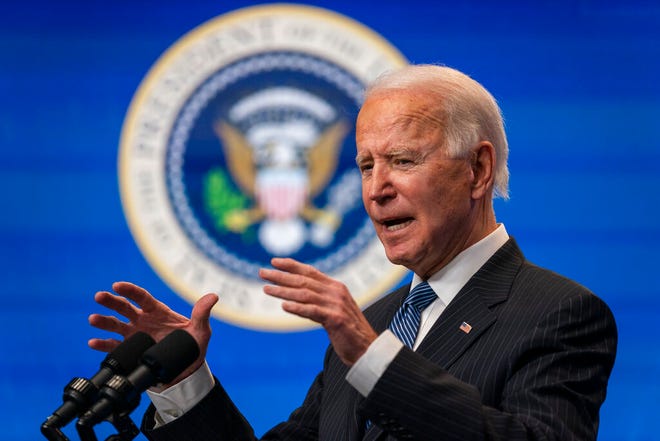
WASHINGTON – President Joe Biden entered the White House calling for unity to meet a convergence of crises, telling Americans that "politics doesn’t have to be a raging fire" as he called on both parties to "start afresh" in his inauguration speech.
It was a repudiation of the flame-throwing politics of President Donald Trump two weeks after a mob of pro-Trump supporters stormed the U.S. Capitol to try to stop the counting of Biden's election victory.
As he leans into messages that won him the election – decency, respect and working together – Republicans are pushing back, arguing Biden's aggressive early agenda doesn't match the talk.
More:Joe Biden rejoins Paris Agreement, requires masks on federal property in swift Day 1 directives
How Biden balances a bold policy agenda with a commitment to unify will in part shape his first 100 days in office.
Republicans want concessions from the president. The White House and the president's allies have countered, saying unity isn't measured by finding complete agreement in Congress but instead in civility and working for all Americans, not just speaking to a political base.
"Navigating this is going to be challenging," said Amy Dacey, executive director at American University's Sine Institute of Policy and Politics. She said unity is "bringing both sides to the table," not agreeing with the opposition party on everything. "Democrats did win the presidency. They are in control of the both the House and the Senate. I would think you will see much more going across the aisle."

Republicans say Biden's agenda divides, not unites
Bipartisanship in Congress could become more challenging as Trump's impeachment trial begins in the Senate Feb. 9.
On his first day in office, Biden took unilateral action to undo defining Trump policies – rejoining the Paris Agreement on climate, canceling the permit for the Keystone XL pipeline and ending Trump's travel ban from several Muslim-majority countries – that were popular among conservatives. Other executive orders in Biden's first week pushed liberal causes such as prohibiting workplace discrimination based on sexual orientation and gender identity and revoking some of Trump's immigration policies.
The White House wants Congress to quickly pass a $1.9 trillion COVID-19 relief package – which even Republicans critical of Trump, including Utah Sen. Mitt Romney, have criticized – weeks after it approved a $900 billion package. And that proposal is on top of an immigration proposal that includes an eight-year pathway to citizenship for nearly 11 million undocumented immigrants.
"A radical leftist agenda in a divided country will not help unify our country," Sen. Marco Rubio, R-Fla, tweeted Friday. "It will only confirm 75 million Americans biggest fears about the new administration."
Sen. John Cornyn, R-Texas, tweeted "Another 'unifying' move by the new Administration?" after Biden announced Monday he overturned Trump's ban on transgender troops serving in the military. (Polling has found 71% of adults are in favor of allowing transgender people to serve in the military.)
More:Biden overturns Trump's ban on transgender troops in first moves for Defense Secretary Austin
Appearing on Fox News Sunday, Rubio said "unity and ideology are two separate things," acknowledging there will be disagreement and and that he understands Biden "comes from the left of center."
But he said the policies that Biden has embraced, on immigration, for example, are "far left of center ideas."
"He may use the language, the rhetoric, even the demeanor of a centrist, but so far his policies don't seem to represent that. And I think that's an important thing to note as we get into these debates about different issues," Rubio said.
Unity is different than bipartisanship, Biden says
In a push for bipartisan dialogue that often was missing in the Trump administration, the White House held a Zoom call Sunday with 16 senators from both sides of the aisle to pitch the administration's COVID-19 relief bill, the American Rescue Plan.
Republicans who took part included Romney, Sens. Susan Collins of Maine, Lisa Murkowski of Alaska, Rob Portman of Ohio, Bill Cassidy of Louisiana and Shelley Moore Capito of West Virginia.
Senators were briefed by three White House officials on the hour-and-fifteen-minute-Zoom chat. But thus far, no Republican senators have expressed support for the bill.
More:Moderate lawmakers are looking to head-off gridlock over Biden's COVID stimulus plan
Pressed about what he means by unity, Biden pointed to ushering in a new tone in Washington – eliminating "the vitriol" and "ad hominem attacks" – while seeking actions that the majority of Americans want. He said most Americans want the federal government to do more to combat the pandemic.
"If you pass a piece of legislation that breaks down on party lines, but it gets passed, it doesn't mean there wasn't unity, it just means it wasn't bipartisan," Biden said Monday. "I prefer these things to be bipartisan, because I'm trying to generate some consensus."
He said it "may take some time."
"We're gonna argue like hell. I'm confident of that. Believe me, I know. I've been there," Biden said. "But I think we can do it in a way that we can get things done for the American people."
Sen. Ron Johnson, R-Wisc., was not convinced.
“I just wish that his actions matched the words of his inaugural in terms of being unifying and healing," Johnson told reporters Monday. "I'm not seeing his initial actions being that which is disappointing.”
More:Poll: A majority of Americans support the impeachment and conviction of Donald Trump
White House Press Secretary Jen Psaki said Republicans aren't looking for "symbolic" gestures. "They are looking for engagement. They're looking to have a conversation. They're looking to have a dialogue. And that's exactly what he's going to do."
She also said seeking bipartisanship on legislation is just one piece of unity.
"It also means projecting that he is going to govern for all people and address all of the issues that the American people are facing," she said.
Biden 'personally engaging' with Republicans, White House says
If Democrats can't find 60 votes in the Senate for the COVID-19 relief bill – the threshold to override a filibuster and requiring support from 10 Republicans – Democrats could seek to pass the package via budget reconciliation. That might open Biden up to criticism for pushing through legislation without bipartisan support.
Under budget reconciliation, only a simple majority is required to pass legislation in the Senate, but bills are subject to certain constraints that make it more difficult for some Democratic priorities like a $15 minimum wage to be included.
Psaki said Biden has been "personally engaging" with Congress members of both parties about the legislation.
"Reconciliation is a means of getting a bill passed," Psaki said. "That does not mean, regardless of how the bill is passed, that Democrats and Republicans cannot both vote for it."
More:Biden signs 'Buy American' executive order
Matt Grossman, who heads the Institute for Public Policy and Social Research at Michigan State University, said it's important Biden finds some bipartisan ground on legislation but believes that isn't tied to his push for unity.
"He mentioned that we have a political differences," Grossman said, referring to Biden's inaugural address, "but that we resolve them through our institutions and through civil debate, and don't see each other as enemies. I don't think any of that is dependent on finding agreement or not finding agreement on public policy."
Dan Pfeiffer, a former senior advisor for President Barack Obama and a Biden supporter, said viewing Biden's unity pitch only through his work with congressional Republicans is a "reductive interpretation."
"The illness that Biden seeks to heal includes – but is much bigger than – the inability of Republicans and Democrats in Washington to work together," Pfeiffer wrote on his web site. He said unity for Biden is about reaching out to all Americans, even those who didn't vote for him, after Trump was more interested in leading "the MAGA movement, not the United States."
"To be clear," Pfeiffer said, "Biden pitched himself as someone who can work with Republicans and he should be judged on whether he makes an effort to do so. But that is not the sum total of his message. Healing the soul of the nation is about much more than making congressional Republicans happy."
But Republicans want to see Biden retreat from some of the progressive stances he campaigned on.
Senate Minority Leader Mitch McConnell on Monday criticized the COVID relief bill as an “imprecise deluge of borrowed money." Last week, he said the Biden administration took "several big steps in the wrong direction" on its first day.
“Now, it’s still early," McConnell added. "There is plenty of time for President Biden to remember that he does not owe his election to the far left."
Staff writers Nicholas Wu, Maureen Groppe and Courtney Subramanian contributed to this report.








